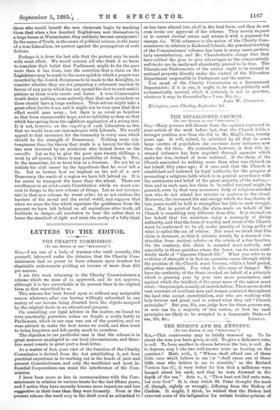THE ESTABLISHED CHURCH.
[To THE EDITOR OF THE " SPECTATOR.".1
SIR, Many persons will dissent from the opinion expressed in your article of the week before last, that the Church holds a stronger position now than she did in Mr. Miall's time, twenty years ago. It will, indeed, be admitted by all that in some large centres of population she exercises more influence now than she did then. My contention, however, is that this in- creased influence has been acquired through agencies which make her less, instead of more national. If the claim of the Church amounted to nothing more than what was claimed on her behalf fifty years ago ; if it were said that the Church is established and endowed by legal authority for the purpose of promoting a religious faith which is in general accordance with the sentiments and belief of the great majority of the nation,— then and in such case, her claim to be called national might be granted, even by that very numerous body of religious-minded men who do not attend her services or conform to her ritual: Moreover, the increased life and energy which she has shown of late years would be held to strengthen her title to such recogni- tion. But in point of fact, the claim made on behalf of the Church is something very different from this. It is claimed on her behalf that her ministers enjoy a monopoly of divine authority, and that the form of worship and ritual of the Church must be conformed to by all, under penalty of being guilty of what is called the sin of schism. Nor must we think that this claim is dormant, or that it subsists merely by a strained con- struction from ancient rubrics on the minds of a few fanatics. On the contrary, this claim is asserted most actively, and especially in those parishes where the boast can be most confi- dently made of "vigorous Church life." What you refer to as evidence of strength is in fact an operative cause through which the position of the Church must become, within a brief period, altogether untenable. For what is this state of things ? We have the authority of the State invoked on behalf of a principle which is growing year by year into more prominence, and against which the intellect of the great mass of the nation must rebel,—the principle, namely, of sacerdotalism. There are no doubt vast numbers of excellent men and women scattered throughout the land who accept sacerdotalism, and who are working with holy fervour and great zeal to extend what they call "Church principles." But you, Sir, can judge how far these persons are, or ever can be, a majority of this nation, or how far such principles are likely to be accepted in a democratic State.—I


































 Previous page
Previous page